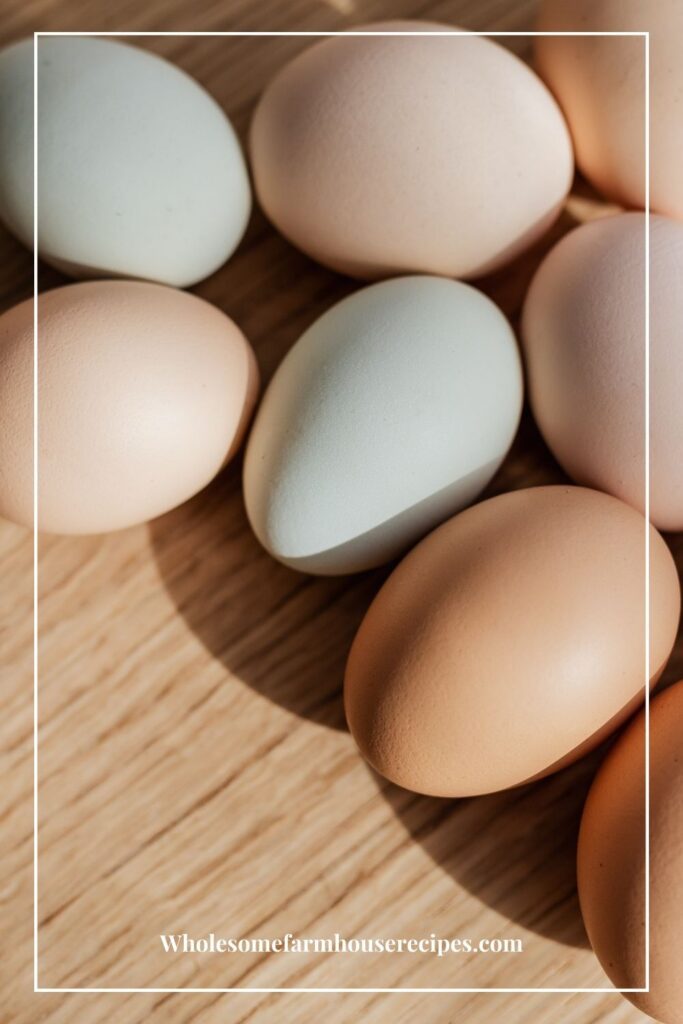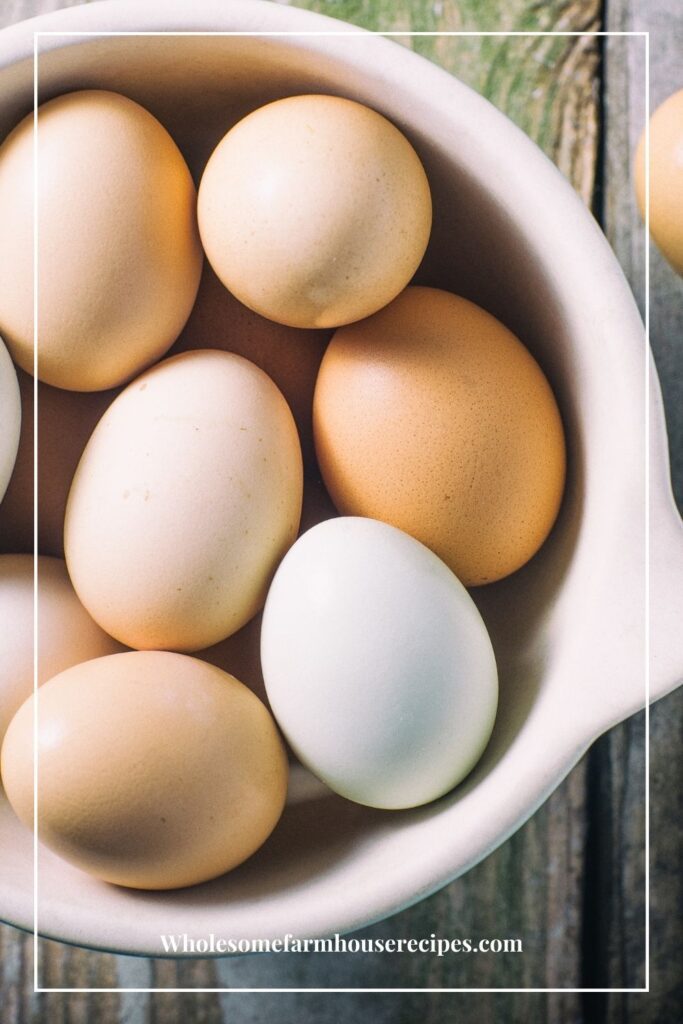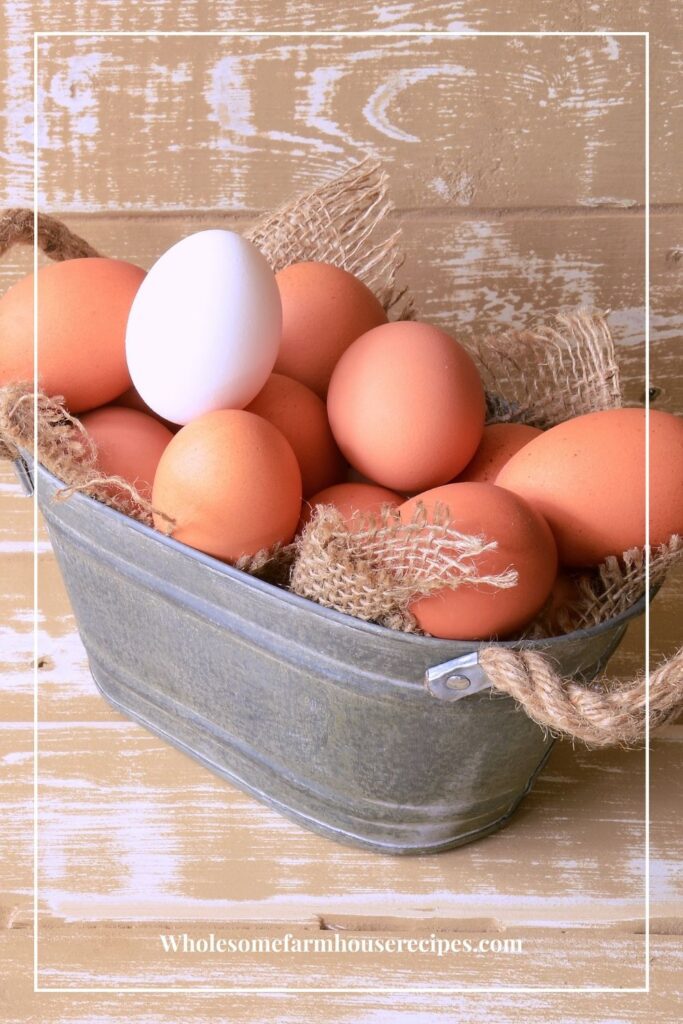Knowing how to store fresh eggs just makes good economical sense. Storing food properly saves money and keeps the food safe and fresh for future use in lots of delicious recipes.
If you’re like me, you have a small flock of backyard chickens that provide fresh farm eggs every day. These days, a lot of people are homesteading and raising chickens as a fun way to bring the whole family together. Eventually, the baby chicks will grow and begin to produce eggs. Sometimes, there are more than we can use in a day. Therefore, we should be cleaver in storing and using them.
Even if you don’t own your own chickens you could end up with extra raw eggs on your hands. Maybe you get fresh eggs from your local small farms or local farmers markets every week. Even if you purchase yours from the grocery store and find a sale, it is smart to store them properly to extend the freshness as long as you can. Therefore, it’s good to know how to store fresh eggs properly so they last for at least a few weeks. Here are some tips.

Farm Fresh Eggs are Different from Store-Bought Eggs
Eggs that you purchase in a store are remarkably different than ones purchased from farmer’s market fresh or gathered from your own backyard chickens.
So, what are the differences between the two?
- Often the farm fresh will have a deeper golden yolk.
- The color of the eggshells will vary depending on the breed of chicken.
- The backyard chicken’s eggshells can be thicker depending on what they are fed.
- The fresh eggs are not processed like the commercial eggs.
- Therefore, the commercial brand should be stored differently than the farm fresh.
Storing Fresh Eggs from the Grocery Store
The eggs you purchase in your grocery store have been washed, dated, and stored in containers. These must be refrigerated. They are already in a safe container and should be placed in the refrigerator for storage right away. Make sure to pay attention to the freshness dates on the carton.

Can I store farm-fresh eggs at room temperature?
Yes, you can. Backyard chicken eggs or eggs purchased at a local farmer’s market that are unwashed can be stored safely at room temperature form several days to a few weeks. However, when stored at room temperature they will degrade faster than those stored in the refrigerator. The hotter your house is, the faster this will happen. Therefore, for the freshest eggs, I recommend storing unwashed fresh eggs at room temperature for approximately one week and only a day or two if your house if very hot and humid.
Additionally, once washed, they must be stored in the refrigerator. Even those from your own flock of birds or the ones you purchase at the local farmers market stand.
Therefore, if you purchase your eggs from a local farmer, make sure to find out if the eggs have been washed first. It makes a difference!
There are affiliate links on this page and we earn commissions if you shop through the links on this page.Best Practice. When in doubt, store clean eggs in the fridge. When refrigerating unwashed eggs, they will last up to 2 to 3 months. Extend the shelf life by making sure to remove them from the original carton and store them in airtight containers or an egg carton storage box so they don’t get jostled around and crack or absorb the refrigerator odors.
Mother Nature is a wonderful thing. Did you know that eggs come with a protective layer that is a natural coating, and it keeps bacteria from getting inside? It is called a protective bloom or cuticle. This is why they can be stored without refrigeration if you do not wash them. Once this protective barrier is washed off, like commercial growers, they must be refrigerated.

Counter Storage Options
The best way to store them on the kitchen counter is in a container. Here are a few great options to consider.
A bowl or basket to keep them from rolling around or being bumped into and cracking.
Another great way is an egg skelter. What are they? If you are new to chicken farming, they are a wonderful gadget for your kitchen if you plan on storing your fresh eggs on the counter. They are a spiral fresh egg storage holder with the new ones being placed on the top and the oldest eggs at the bottom with easy access to both ends. As you remove one, the eggs slide down and there is room for one more at the top.
A ceramic egg plate is pretty and keep them from cracking into each other.
You might be wondering why store eggs on the counter. It’s simple, they want to enjoy their eggs with the most flavor and color. The longer they are in the refrigerator, both the taste and color tend to decline. However, they will also last in the refrigerator up to seven times longer. Therefore, it is sometimes a matter of taste and longevity. Whether or not to store them on the counter or refrigerate.
Can you freeze eggs? Yes, just separate the egg whites from the yolk. A great option is to store the egg whites and yolks in an ice cube tray. Then you can thaw them and use them in recipes.

A Simple Way to Tell if You’re a Bad Egg from a Good One
If you let your chickens roam freely in your backyard, rather than use nesting boxes, sometimes you find eggs laid all over, then you need to figure out if it is freshly laid or old. Additionally, sometimes you might want to test one you purchased from a store or a farm stand.
First, use your sense of smell. If you smell something unpleasant and rotten, it is a good sign that it should be discarded.
Second, take a look. If you are using eggs and you are unsure of their expiration date or freshness, crack it in a bowl before using it in any recipe. You will be able to see and smell if it is fresh. Look for bacterial growth by checking for discoloration in the yolk or whites such as pink, blue, green, or black. Additionally, check the outer egg shells for any cracks, or powdery areas.
The egg float test is an easy way to check the freshness.
It is easy to perform this test. Place the egg in question in a large pan, glass, or bowl of cold water. If you are testing just one a glass of water will do.
Watch what the egg does. As a general rule, if the egg sinks, tilts on its side, and rests on the bottom, it is fresh.
If it the pointy end tilts upwards or floats, it is old and it is time to discard it.
Why does this work? When an egg ages, the tiny air pocket inside will continue to grow as the water is expelled and the air pocket inside becomes larger.
A Simple Way to Tell a Bad Egg from a Good One
Kitchen Essentials
Materials
- Farm Fresh Eggs
- Uncooked Eggs
Instructions
- First, use your sense of smell. If you smell something unpleasant and rotten, it is a good sign that it should be discarded.
- Second, take a look. If you are using eggs and you are unsure of their expiration date or freshness, crack it in a bowl before using it in any recipe. You will be able to see and smell if it is fresh. Look for bacterial growth by checking for discoloration in the yolk or whites such as pink, blue, green, or black. Additionally, check the outer egg shells for any cracks, or powdery areas.
- The egg float test is an easy way to check the freshness.
- It is easy to perform this test. Place the egg in question in a large pan, glass, or bowl of cold water. If you are testing just one a glass of water will do.
- Watch what the egg does. As a general rule, if the egg sinks, tilts on its side, and rests on the bottom, it is fresh.
- If it the pointy end tilts upwards or floats, it is old and it is time to discard it.







